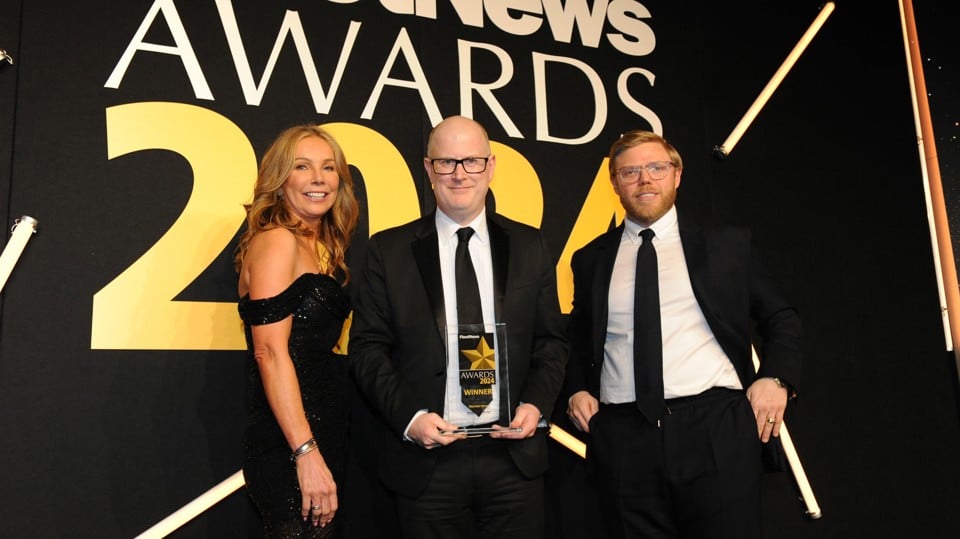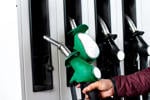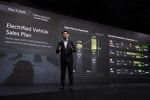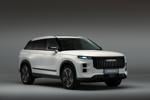Hyundai and stablemate Kia have been two of the biggest beneficiaries from the transition by fleets to electric cars, aided by the supply issues affecting the market due to Covid-induced plant closures and parts shortages.
The UK, while notoriously open to new entrants (unlike the German, French and Italian markets which continue to be dominated by domestic producers), nevertheless still favoured the premium marques, notably the German trio of Audi, BMW and Mercedes-Benz, as well as the traditional fleet staples of Ford, Vauxhall and Volkswagen, in the years leading up to 2020. Electrification and availability have helped to blur those lines.
Hyundai had already laid the groundwork for an electric revolution with the introduction of the well-received BEV/PHEV/HEV-optioned Ioniq in 2016 before launching the excellent 300-plus range Ioniq 5 in 2022.
It seized an opportunity and, in the space of a couple of years, has changed brand perceptions. No longer viewed as a budget carmaker aspiring to be mainstream, Hyundai is now able to compete – and win - against electric cars from premium brands.
Augmenting this transformation was model availability.
As a South Korean industrial conglomerate making an extensive range of products from defence systems to petrochemicals, Hyundai did not simply stop ordering semi-conductors and other key components like many car manufacturers.
Consequently, come 2021 and 2022 when demand began rising as fleets looked to replace ageing vehicles, Hyundai was in a strong position to fulfil orders and secure business from drivers unwilling to wait up to two years for new cars from other marques.
The impact on its registrations has been startling when evaluated against averaging pricing. In 2021, Hyundai sold just under 70,000 units with true fleet accounting for 26,000 units. Last year, it sold 87,000, with true fleet rising to more than 28,000.
Higher selling price and richer model mix
Critics might argue that Hyundai is simply back at the levels it enjoyed in 2018 when it sold almost 90,000 cars; however, its market position comes with a much higher average selling price and a much richer model mix.
Six years ago, the Tucson started at below £22,000 (and a lot less than that with fleet discounts); today, it weighs in at £32,000, rising to a top-spec price of more than £46,000. Performance versions of the Ioniq 5 touch £70,000.
It’s one of the most dramatic business metamorphoses of recent times.
The momentum has continued with the launch of the Kona, Fleet News’s compact SUV of 2024, which mirrors the original Ioniq by having a range of powertrains, including a long-range full electric.

Hyundai Motor UK head of fleet Tim White (pictured above) knows not to rest on his laurels though. “We made headway during the supply constraints; now we need to hold onto the gains,” he told Fleet News.
That was made more challenging last year due to a pause in supply of the electric Kona as the new model came to market. It resulted in a shortfall of almost 500 BEV units compared to 2022 (at 6,308), while overall Kona units dropped by almost 1,900 to 15,459. It wasn’t a seamless transition.
Some of the slack was taken up by the Tucson plug-in hybrid, which doubled registrations to 6,073, consolidating the car’s position as Hyundai’s best seller with 34,469 units sold. It also served as a timely reminder about the demand for other cars beyond full electric.
The pendulum will swing back this year as Tucson embarks upon the switch from old to new, resulting in a temporary shortage of two-wheel drive PHEV models. However, Kona is in full supply.
“It’s plate-spinning,” admitted White. “But when we have that (the 2WD PHEV – production started in July), we will be in good shape.”
True fleet target of 5% next year
In the first half of the year, Hyundai took 3.8% of the true fleet market and remains committed to its 2025 target of 5%. It expects to end 2024 on 16,000 and “as close to 4% share as we can get”.
White added: “We are missing volume in areas where we don’t want to push, such as rental and broker markets.”
While rental units have increased threefold year-on-year, they remain less than 8% of Hyundai’s total volumes, while its share of the rental sector is a manageable 6%.
Just over 18% of the 53,964 registrations to the end of July are full electric, putting the carmaker on course to achieve the 22% ZEV Mandate target. According to White, two-thirds of current fleet orders come with a plug, while 55% are full electric.
Kona EV accounts for a third of the model’s order bank, positioned at the junior grades on fleet choice lists.
Meanwhile, 20% of Ioniq 5 and Ioniq 6 volumes are hitting senior grades, emphasising Hyundai’s elevation up the premium ladder.
A plug-in Sante Fe is now available to order, while the Inster full electric affordable small SUV is due at the start of 2025 and will be “interesting in the fleet arena,” White said.
“We will potentially have one other car that will fill a gap in the range.”
That model is likely to be a large electric SUV, already shown at the LA motor show in concept form as the Seven. It’s tipped to become the Ioniq 7 with a 2025 launch date and would take the model line up to 11.
Refreshing the range helps Hyundai to keep relative control of residual values by managing its pricing and discount strategy. It’s one of the biggest issues facing leasing providers, hitting profits as the market undergoes a significant correction.
Adding to those market-wide pressures are the actions of some manufacturers which are cutting prices of their electric models in an attempt to avoid the fines from failing to meet ZEV Mandate targets. Some are also pushing stock into the rental market, where total registrations have doubled year-on-year.
“We think there could be a little more to go on residual values in the second half of the year, but it is hard to predict,” White said.
“However, we’ve not had to rely on rental for our EV volumes – ours are through true fleet.”
Dominic Gill, Hyundai head of corporate sales and subscription, added: “As long as we do long cycle business, we can manage our residual values better for a smoother curve.”
Hyundai is also supporting the used market for electric cars by adding bolt-on products, such as free home chargers through Ohme to encourage uptake.
“We can manage the lifecycle more efficiently,” Gill said. “We are doing everything we can to protect our RVs.”
Genesis joins the fleet team
White’s remit expanded earlier this year when Hyundai’s premium sub-brand Genesis was brought into the fold. He believes the high-end marque has significant potential in fleet as a c-suite offering and gives the team an opportunity to present a broader range of models to suit all grades.
“We can now have one conversation with leasing companies about both brands,” he said.
It also facilitates negotiations with smaller fleets, a part of the market White believes has been forsaken by many leasing companies.
“We have done a good job with large fleets, and we are now coming down into sub 100 and potentially sub 25 to help them with their EV adoption,” he said. “A lot of leasecos have given up on that and leaving it to the broker market.”
Hyundai has restructured its account team into five regional corporate sales managers supported by a team of three virtual account managers for 25-99-vehicle fleets and two ‘active sales’ managers targeting SMEs running fewer than 25 vehicles, either direct or via brokers.
Gill said: “We can now hit all the bases from major to micro fleet and we have partnered with the AA for aftersales with its dedicated support team handling any in-life issues to minimise VOR (vehicle off-road) times.”
White added: “With the increase in our customer base, we have realised that we have to look after everyone if we want to renew them. So the AA relationship is an opportunity to have a dedicated fleet team for any issues. We’ve had great feedback.”
Expanded fleet team, improved communications
His team has further expanded with the appointment in May of Mark Johnson as national contract hire and leasing manager. It’s a position that Hyundai has not had for three years although, White discloses with typical frankness, “in retrospect, perhaps we should’ve”.
He said: “It’s an important role; we have to engage with them – they have the relationship with the end users.”
The expanded team enables a more granular and detailed focus on the business strategy, one which includes improved customer communications to boost retention.
The retail network will play a critical role in this, particularly supporting customers on their electrification journey.
“A lot of traditional retailers are selling PCP whereas for electric vehicles, contract hire is a more obvious transaction method,” White said.
“We are looking at how we train and educate our network on EV adoption tools, campaigns, the offer of free chargers and how they influence company car drivers. We incentivise them to handle the enquiry even if they don’t handle the sale.”
Hyundai continues to invest heavily in electrification with a lot of its focus on reducing charging times, rather than simply extending range. Many of its models can charge from 20-80% within 18 minutes which is “an important message” to get to out there, said White.
“It’s about ease and speed to top up,” he added.
The company is also developing its hydrogen capability and has already concluded a series of truck trials, alongside cars.
“With Nexo , we have proven you can make it work in terms of range and fill times,” White said. “The challenge is infrastructure, but when the UK catches up, we have the product.
“We think commercial vehicles will be the first step and they will provide the gateway for passenger vehicles.”





















Login to comment
Comments
No comments have been made yet.